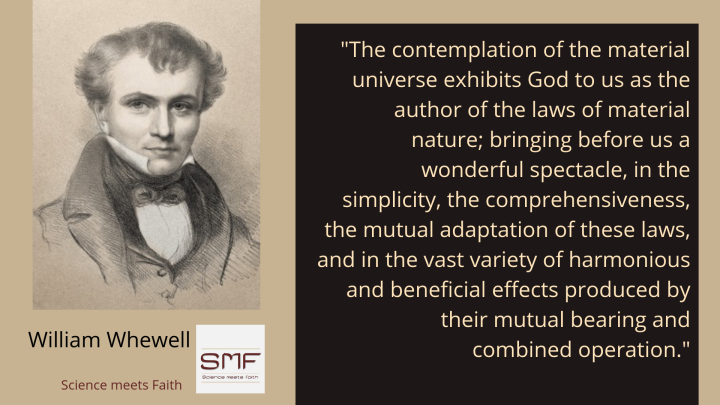
William Whewell (24 May 1794 – 06 March 1866) was a polymath and Anglican priest He was known for his writings on science, philosophy, theology, and history of science. He coined the term “scientist” as a term parallel to “artist”[see 1].
Among the most influential of the works by Whewell was History of the Inductive Sciences from the Earliest to the Present Time (1837) which Darwin credited with contributing to the scientific method he used.
Charles Darwin quotes Whewell on the title page of the The Origin of Species to express the importance of laws in the natural sciences – these laws, not single and rare interventions are the ways of God’s working:
“But with regard to the material world, we can at least go so far as this – we can perceive that events are brought about not by insulated interpositions of Divine power, exerted in each particular case, but by the establishment of general laws. (W. Whewell, Bridgewater Treatise)” [2]
Whewell, on the other hand was not an easy convert to Darwin’s new theory, as we can see from Whewell’s reply in January 1860 [3]:
My dear Mr Darwin
I have to thank you for a copy of your book on the ‘Origin of Species’. You will easily believe that it has interested me very much, and probably you will not be surprized to be told that I cannot, yet at least, become a convert to your doctrines. But there is so much of thought and of fact in what you have written that it is not to be contradicted without careful selection of the ground and manner of the dissent, which I have not now time for. I must therefore content myself with thanking you for your kindness.
believe me | Yours very truly | W Whewell
And to conclude, here are two texts from the Whewell’s Bridgewater Treatise “Astronomy and General Physics Considered with Reference to Natural Theology”, written in 1833:
“The contemplation of the material universe exhibits God to us as the author of the laws of material nature ; bringing before us a wonderful spectacle, in the simplicity, the comprehensiveness, the mutual adaptation of these laws, and in the vast variety of harmonious and beneficial effects produced by their mutual bearing and combined operation.”
“Let us consider for a moment what takes place in the mind of a student of nature when he attains to the perception of a law previously unknown, connecting the appearances which he has studied. A mass of facts which before seemed incoherent and unmeaning, assume, on a sudden, the aspect of connexion and intelligible order. Thus, when Kepler discovered the law which connects the periodic times with the diameters of the planetary orbits; or, when Newton showed how this and all other known mathematical properties of the solar system were included in the law of universal gravitation according to the inverse square of the distance; particular circumstances which, before, were merely matter of independent record, became, from that time, indissolubly conjoined by the laws so discovered. The separate occurrences and facts, which might hitherto have seemed casual and without reason, were now seen to be all exemplifications of the same truth. The change is like that which takes place when we attempt to read a sentence written in difficult or imperfect characters. For a time the separate parts appear to be disjoined and arbitrary marks ; the suggestions of possible meanings, which succeed each other in the mind, fail, as fast as they are tried, in combining or accounting for these symbols: but at last the true supposition occurs; some words are found to coincide with the meaning thus assumed ; the whole line of letters appear to take definite shapes and to leap into their proper places ; and the truth of the happy conjecture seems to flash upon us from every part of the inscription.”
________________________
[2] Charles Darwin, On the Origin of Species (1859), Title page
[3] Richard Carter: 02-Jan-1860: Whewell sets the right tone
